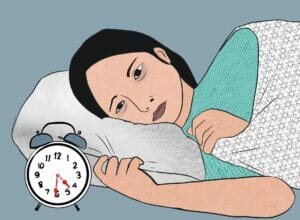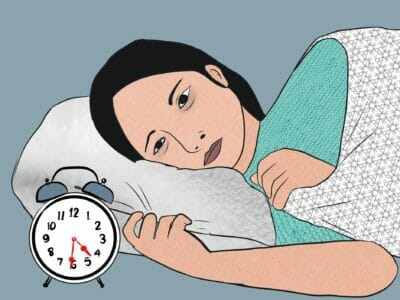Sleep disorders are a growing concern for people all around the world. Many individuals suffer from various forms of sleep deprivation, including insomnia, sleep apnea, and restless leg syndrome. While there are many medications available to help alleviate these symptoms, some may prefer natural remedies instead. One such remedy is 5-HTP, a naturally occurring amino acid that has been found to have potential benefits for those struggling with sleep disorders. In this article, we will explore the relationship between 5-HTP and sleep disorders in more detail and investigate whether or not it can offer relief for those experiencing disrupted rest patterns.
Understanding Sleep Disorders: Causes and Symptoms
Sleep disorders can be caused by a variety of factors, such as medical conditions, lifestyle habits, and environmental influences. Some of the most common causes of sleep disorders include stress and anxiety, depression, chronic pain or illness, medication use, alcohol consumption before bedtime, and poor sleeping environment. It is important to identify the underlying cause of a sleep disorder in order to effectively treat it.
 Symptoms of sleep disorders can vary depending on the type of disorder an individual may be experiencing. Symptoms commonly associated with insomnia include difficulty falling asleep or staying asleep throughout the night.
Symptoms of sleep disorders can vary depending on the type of disorder an individual may be experiencing. Symptoms commonly associated with insomnia include difficulty falling asleep or staying asleep throughout the night.
Sleep apnea symptoms often involve loud snoring and pauses in breathing during sleep.
Restless leg syndrome symptoms usually develop during periods of rest or relaxation and are characterized by uncomfortable sensations in the legs accompanied by an irresistible urge to move them.
Identifying these symptoms early on can help an individual seek proper treatment for their particular type of sleep disorder.
What is 5-HTP and How Does it Work?
5-HTP, also known as 5-hydroxytryptophan, is a naturally occurring amino acid that serves as a precursor to serotonin. Serotonin is a neurotransmitter that plays an important role in regulating mood, behavior, and sleep-wake cycles. By increasing the levels of serotonin in the brain, 5-HTP has been found to have potential benefits for those struggling with sleep disorders.
When taken orally as a supplement, 5-HTP is converted into serotonin within the brain. This can help regulate sleep-wake cycles and improve feelings of relaxation and calmness at bedtime. Additionally, research suggests that 5-HTP may be particularly effective for improving symptoms of insomnia by helping individuals fall asleep faster and reducing nighttime awakenings.
Overall, while further research is needed to fully understand how 5-HTP works in relation to various sleep disorders, there is promising evidence suggesting its potential benefits for improving overall quality of sleep. As with any supplement or medication though it’s always best to consult your doctor before starting use especially if you’re already taking prescribed medications which could interfere with positive effectivity upon using this natural remedy.
5-HTP as a Natural Remedy for Insomnia
5-HTP (5-hydroxytryptophan) is a naturally occurring amino acid that helps to increase the production of serotonin in the brain. Serotonin is an important neurotransmitter that regulates mood, appetite, and sleep. Because of its ability to positively affect serotonin levels, 5-HTP has been used as a natural remedy for insomnia and other sleep disorders.
Studies have found that taking 5-HTP supplements can help improve sleep quality by reducing the time it takes to fall asleep and increasing total sleep time. Additionally, 5-HTP may also help regulate circadian rhythms and improve daytime alertness. However, it is worth noting that some people may experience side effects such as nausea or dizziness when taking 5-HTP supplements.
While more research is needed to fully understand the potential benefits of using 5-HTP as a natural remedy for insomnia and other sleep disorders, many individuals have reported positive results from using this supplement. As with any new treatment or supplement, it’s always recommended to speak with a healthcare professional before starting use.
Can 5-HTP Help with Sleep Apnea?
Sleep apnea is a common sleep disorder that affects millions of people worldwide. It is characterized by interrupted breathing during sleep, leading to restless and disruptive nights.
One potential remedy for this condition is 5-HTP or 5-Hydroxytryptophan, which is known to have calming and relaxing effects on the brain.

Studies have shown that 5-HTP can help regulate breathing patterns during sleep, reduce snoring, and improve overall sleep quality in individuals with mild to moderate cases of sleep apnea.
While there are no guarantees that 5-HTP will work for everyone suffering from sleep apnea.
It may be a natural alternative worth considering alongside traditional medical treatments such as continuous positive airway pressure (CPAP) therapy.
However, it’s essential to consult your doctor before taking any supplements or medications regularly and ensure that you’re not allergic to any ingredients in the supplement.
The Benefits of 5-HTP for Restless Leg Syndrome
Restless Leg Syndrome is a condition that affects many individuals, causing unpleasant sensations and an uncontrollable urge to move one’s legs. This can result in disrupted sleep patterns and lead to daytime fatigue. However, recent studies have shown that 5-HTP supplementation may have beneficial effects on RLS symptoms by increasing serotonin levels in the brain. Serotonin plays a crucial role in regulating mood, appetite, and sleep patterns, making it an important neurotransmitter for those struggling with RLS.
Additionally, 5-HTP has been found to improve overall sleep quality by increasing REM (Rapid Eye Movement) sleep duration and reducing the number of nighttime awakenings. It has also been shown to help regulate circadian rhythms – our biological clock that controls when we feel awake or tired – helping individuals fall asleep more easily at night. Furthermore, unlike prescription medications used for treating RLS which often come with unwanted side-effects; 5-HTP is usually well-tolerated and doesn’t cause drowsiness during the day.

Potential Side Effects and Risks of Using 5-HTP for Sleep Disorders
Although 5-HTP may have potential benefits for those struggling with sleep disorders, it is important to be aware of the potential side effects and risks associated with its use. Some individuals who have taken 5-HTP for sleep disorders have reported experiencing mild gastrointestinal symptoms such as nausea, vomiting, and diarrhea. Others have experienced more serious adverse effects including seizures and heart palpitations. It is worth noting that these side effects are rare, but they should not be ignored.
Another risk associated with the use of 5-HTP for sleep disorders is its potential interaction with other medications or supplements. For example, taking 5-HTP alongside antidepressant drugs can lead to a potentially fatal condition called serotonin syndrome – a dangerous buildup of serotonin in the brain. Additionally, some herbs and supplements can interact negatively with 5-HTP and worsen certain medical conditions like high blood pressure or diabetes. As always, it’s best to consult your healthcare provider before trying any new supplement or medication – especially if you’re already taking other medications or dealing with underlying health conditions that could worsen by using this remedy.
How to Incorporate 5-HTP into Your Sleep Routine: Dosage and Recommendations
If you are considering incorporating 5-HTP into your sleep routine, it is important to first consult with a healthcare professional who can advise you on the correct dosage based on your individual needs. Generally, the recommended starting dose for adults is 100-200mg of 5-HTP taken orally before bed. It may take several weeks for the full effects to be felt, so consistent use is key.
It is also important to note that 5-HTP should not be taken in combination with other medications or supplements without first consulting a healthcare provider. Additionally, if you experience any adverse side effects while taking 5-HTP such as nausea, headache or dizziness discontinue use and seek medical attention immediately.
 Incorporating natural remedies like 5-HTP into your sleep routine may provide an alternative solution for those struggling with sleep disorders.
Incorporating natural remedies like 5-HTP into your sleep routine may provide an alternative solution for those struggling with sleep disorders.
However, it’s crucial to do so under guidance from a qualified healthcare practitioner and in conjunction with other healthy habits such as regular exercise and maintaining a consistent sleep schedule.
To Summarize:
5-HTP, produced from the seeds of an African plant, is a naturally-occurring amino acid and an intermediate in the synthesis of serotonin, a hormone that plays a key role in sleep and mood regulation. It’s derived from the essential amino acid L-tryptophan and increases the amount of serotonin. Serotonin is a precursor to the sleep hormone melatonin, suggesting the potential effects of 5-HTP on sleep problems.
Many have found that 5-HTP treats depression and anxiety effectively. Studies found that taking 5-HTP reduced associated symptoms of these conditions and improved sleep quality. Moreover, 5-HTP and tryptophan together have been found to enhance serotonin production, which indirectly helps nerve cells regulate mood and sleep patterns.
For those struggling with sleep disorders, doctors recommend taking 100 mg of the best 5-HTP supplement, typically 30 minutes before bed time for optimal absorption. Over a period of 4 weeks, administration inhibits carbon dioxide-induced panic in panic disorder patients, thereby reducing arousal and facilitating quality sleep.
It’s noteworthy that 5-HTP’s beneficial effects extend to curbing cravings, implying its usefulness in weight management. Despite these promising findings, more long-term studies are needed to ascertain the safe amount of 5-HTP to treat various conditions. Lastly, 5-HTP might influence GABA (Gamma-Aminobutyric Acid), another hormone crucial for sleep, but the connection is more of an indirect, and warrants further research. As of now, 5-HTP remains an over-the-counter supplement widely used for sleep and anxiety issues.
Common Questions:
Q: What is 5-HTP?
A: 5-HTP is a compound produced by the body from the amino acid tryptophan. It is a precursor to the neurotransmitter serotonin, which regulates mood, appetite, and sleep.
Q: How does 5-HTP affect sleep?
A: 5-HTP may help promote sleep by increasing the production of serotonin, which is involved in regulating sleep-wake cycles. Studies have found that taking 5-HTP before bedtime may help reduce sleep latency, the time it takes to fall asleep, and improve overall sleep quality.
Q: Can 5-HTP be used to treat sleep disorders?
A: Some studies suggest that 5-HTP may be helpful for treating sleep disorders such as sleeplessness, sleep terrors, and poor sleep quality associated with anxiety or depression. However, more research is needed to confirm its effectiveness.
Q: How does 5-HTP compare to other supplements for sleep, like melatonin or l-tryptophan?
A: 5-HTP and melatonin both affect sleep in different ways, with melatonin regulating the body’s internal clock, and 5-HTP increasing serotonin production. L-tryptophan is a precursor to 5-HTP and is also involved in serotonin production. It is best to consult with a healthcare professional to determine which supplement may be best for your individual needs.
Q: How much 5-HTP should I take for sleep?
A: The recommended dosage of 5-HTP for sleep varies by individual and should be determined by a healthcare professional. In general, studies have used doses ranging from 100 to 400 mg taken 30 minutes to 1 hour before bedtime.
Q: Are there any side effects or risks associated with taking 5-HTP?
A: Although generally considered safe, 5-HTP may cause mild side effects such as nausea, diarrhea, or stomach discomfort. It should not be taken with antidepressant medications or other medications that increase serotonin levels, and should only be taken under the guidance of a healthcare professional.
Q: What is griffonia simplicifolia extract, and how is it related to 5-HTP?
A: Griffonia simplicifolia is a plant native to West Africa that contains high levels of 5-HTP. Supplements made from its seeds are a natural source of 5-HTP and are often used as an alternative to synthetic forms of the supplement.
Q: Can 5-HTP reduce anxiety?
A: Some studies suggest that 5-HTP may help reduce symptoms of anxiety by increasing serotonin levels in the brain. However, more research is needed to confirm its effectiveness for this purpose.
Q: Should I take 5-HTP before bed, or can it be taken at other times during the day?
A: 5-HTP is typically taken 30 minutes to 1 hour before bedtime to promote sleep. It is not recommended to take 5-HTP during the day, as it could cause drowsiness.
Q: How does 5-HTP affect mood?
A: Serotonin, which is involved in regulating mood, is produced in the brain from 5-HTP. Some research has found that taking 5-HTP may help improve mood, particularly in those with depression or anxiety.
Q: How does the capsule form of 5-HTP compare to other forms, such as tablets or powders?
A: Capsules are a convenient and easy way to take 5-HTP. However, the effects of the supplement may vary depending on the form it is taken in, and it is best to consult with a healthcare professional to determine which form may be best for you.



 5-HTP and Weight Loss: 5-HTP Could Help You!
5-HTP and Weight Loss: 5-HTP Could Help You!
